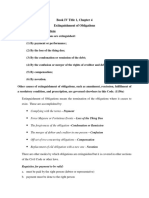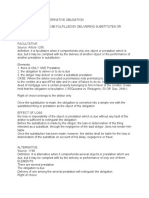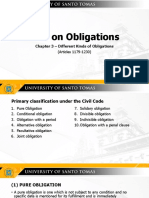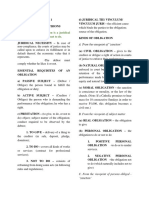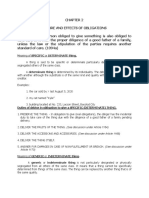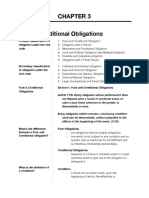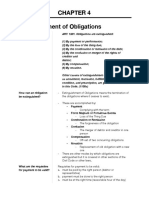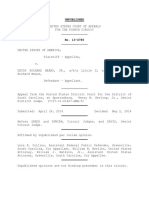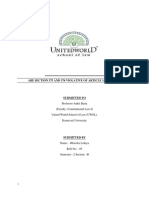0%(1)0% found this document useful (1 vote)
196 viewsObligations and Contracts ART. 1165
Obligations and Contracts ART. 1165
Uploaded by
AstaxYuno1) When a determinate thing is owed under a contract, the creditor can compel the debtor to deliver it. If an indeterminate or generic thing is owed, the creditor can ask that the obligation be fulfilled at the debtor's expense.
2) If the debtor delays delivery or promised to deliver the same thing to multiple people with different interests, the debtor is responsible for any loss due to chance events until delivery is made.
3) A determinate thing is specifically designated while an indeterminate thing refers only to a class or genus without particulars. The creditor brings non-delivery of a determinate thing to court to compel delivery rather than using force against the debtor.
Copyright:
© All Rights Reserved
Available Formats
Download as DOCX, PDF, TXT or read online from Scribd
Obligations and Contracts ART. 1165
Obligations and Contracts ART. 1165
Uploaded by
AstaxYuno0%(1)0% found this document useful (1 vote)
196 views2 pages1) When a determinate thing is owed under a contract, the creditor can compel the debtor to deliver it. If an indeterminate or generic thing is owed, the creditor can ask that the obligation be fulfilled at the debtor's expense.
2) If the debtor delays delivery or promised to deliver the same thing to multiple people with different interests, the debtor is responsible for any loss due to chance events until delivery is made.
3) A determinate thing is specifically designated while an indeterminate thing refers only to a class or genus without particulars. The creditor brings non-delivery of a determinate thing to court to compel delivery rather than using force against the debtor.
Original Description:
OBLIGATIONS AND CONTRACTS | ART. 1165
Original Title
ART 1165
Copyright
© © All Rights Reserved
Available Formats
DOCX, PDF, TXT or read online from Scribd
Share this document
Did you find this document useful?
Is this content inappropriate?
1) When a determinate thing is owed under a contract, the creditor can compel the debtor to deliver it. If an indeterminate or generic thing is owed, the creditor can ask that the obligation be fulfilled at the debtor's expense.
2) If the debtor delays delivery or promised to deliver the same thing to multiple people with different interests, the debtor is responsible for any loss due to chance events until delivery is made.
3) A determinate thing is specifically designated while an indeterminate thing refers only to a class or genus without particulars. The creditor brings non-delivery of a determinate thing to court to compel delivery rather than using force against the debtor.
Copyright:
© All Rights Reserved
Available Formats
Download as DOCX, PDF, TXT or read online from Scribd
Download as docx, pdf, or txt
0%(1)0% found this document useful (1 vote)
196 views2 pagesObligations and Contracts ART. 1165
Obligations and Contracts ART. 1165
Uploaded by
AstaxYuno1) When a determinate thing is owed under a contract, the creditor can compel the debtor to deliver it. If an indeterminate or generic thing is owed, the creditor can ask that the obligation be fulfilled at the debtor's expense.
2) If the debtor delays delivery or promised to deliver the same thing to multiple people with different interests, the debtor is responsible for any loss due to chance events until delivery is made.
3) A determinate thing is specifically designated while an indeterminate thing refers only to a class or genus without particulars. The creditor brings non-delivery of a determinate thing to court to compel delivery rather than using force against the debtor.
Copyright:
© All Rights Reserved
Available Formats
Download as DOCX, PDF, TXT or read online from Scribd
Download as docx, pdf, or txt
You are on page 1of 2
OBLIGATIONS AND CONTRACTS
ART. 1165
ART. 1165. When what is to be delivered is a determinate thing, the
creditor, in addition to the right granted him by Article 1170, may
compel the debtor to make the delivery. If the thing is indeterminate or
generic, he may ask that the obligation be complied with at the
expense of the debtor. If the obligor delays, or has promised to deliver
the same thing to two or more persons who do not have the same
interest, he shall be responsible for any fortuitous event until he has
effected the delivery. (1096)
A determinate or specific thing is something which is susceptible of particular
designation or specification. (ex.) Mercedez Benz Car Model 2000, Chasis No.
12345678910 with Plate No. BBB 2222.
An indeterminate or generic thing is something which is not particularized or
specified but has reference only to class or genus. (ex) a money, a car etc.
Paragraph 1 does not mean that the creditor can use force or violence upon the
debtor. The creditor must bring the matter to the court and the court and will be the
one to order the delivery. When a debtor does not fulfill his obligation to deliver a
determinate thing the creditor may avail himself of the following actions:
(1.) Complaint for specific performance;
(2.) Complaint fore recission of the obligation;
(3.) Compalint for damages.
An obligation to deliver a determinate thing as a general rule is extinguished if the
thing is lost due to fortuitous events. Whereas an obligation to deliver an
indeterminate or generic thing is not extinguished by fortuitous events.
Genus Nunguam Perit (Genus Never Perishes)
A fortuitous event is an extra ordinary event which cannot be foreseen or which
though foreseen is inevitable. As a general rule no person shall be responsible for
those events which could not be foreseen or which though foreseen were inevitable
except:
1.) In cases expressly specified by law;
2.) When it is stipulated by the parties;
3.) When the nature of the obligation requires assumption of risk.
Article 1165 paragraph 3 is an example of an exception expressly provided by law.
Thus id the debtor is guilty of delay in the performance of his obligation or has
promised to deliver the same thing to two or more persons who do not have
common interest he shall be liable for the loss of the thing by reason of fortuitous
event until he has effected the delivery thereof. Delay in paragraph 3 speaks of
extra ordinary or legal delay and not ordinary delay. Extra ordinary delay is a delay
tantamount to non-fulfillment of obligation and arises after an extrajudicial or
judicial demand had been made upon the debtor.
You might also like
- Law On Obligations and Contract ArticlesDocument8 pagesLaw On Obligations and Contract ArticlesLouisa MondragonNo ratings yet
- Chapter 2 - ObliconDocument35 pagesChapter 2 - ObliconHannah BarrantesNo ratings yet
- Law On Obligations and ContractsDocument22 pagesLaw On Obligations and ContractsLuhenNo ratings yet
- Article 1165: Labor Law and LegislationDocument13 pagesArticle 1165: Labor Law and LegislationRalph100% (1)
- Art 1156-1178Document3 pagesArt 1156-1178zetters0360% (5)
- Section 6 - Obligations With A Penal Cause (Arts. 1126-1230)Document11 pagesSection 6 - Obligations With A Penal Cause (Arts. 1126-1230)Patricia DesateNo ratings yet
- OBLICON FAQs - 1179-1192Document3 pagesOBLICON FAQs - 1179-1192BalangNo ratings yet
- Coblaw Chap4Document16 pagesCoblaw Chap4Charlene TiaNo ratings yet
- Articles 1163-1169 PDFDocument39 pagesArticles 1163-1169 PDFBlue PerezNo ratings yet
- Article 1184: Positive ConditionDocument7 pagesArticle 1184: Positive ConditionPATRICIA AURELIONo ratings yet
- Obligations SummaryDocument18 pagesObligations SummaryAshley Levy San PedroNo ratings yet
- Article 1184 - Article 1192Document2 pagesArticle 1184 - Article 1192Merry Justine BodegasNo ratings yet
- Module 4 - Oblicon Chapter 3 Different Kinds of ObligationDocument4 pagesModule 4 - Oblicon Chapter 3 Different Kinds of Obligationgiezel francoNo ratings yet
- CHAPTER 3, Section 6: Obligations With A Penal ClauseDocument13 pagesCHAPTER 3, Section 6: Obligations With A Penal ClauseSergio ConjugalNo ratings yet
- OBLICON - Module 3&4Document12 pagesOBLICON - Module 3&4Ma Leslie BuhanghangNo ratings yet
- Kinds of ObligationsDocument5 pagesKinds of ObligationsSheen Hezel MagbanuaNo ratings yet
- Article 1206Document2 pagesArticle 1206CG WitchyNo ratings yet
- Article 1196Document17 pagesArticle 1196Christlyn Joy BaralNo ratings yet
- Module 3 - ExplainDocument22 pagesModule 3 - ExplainMCM EnterpriseNo ratings yet
- Oblicon Chapter 2 ReviewerDocument3 pagesOblicon Chapter 2 Reviewerprivate lifeNo ratings yet
- Art 1169 To 1173Document10 pagesArt 1169 To 1173Jenine EjercitoNo ratings yet
- OBLICON, Section 4Document2 pagesOBLICON, Section 4Jhudiel BaraquiaNo ratings yet
- Study Guide No. 3 (Chapter 3)Document8 pagesStudy Guide No. 3 (Chapter 3)Hannah Marie AliñoNo ratings yet
- Oblicon 3Document10 pagesOblicon 3Christian Paul Gabriel100% (1)
- OBLICON REVIEWER Article 1162Document1 pageOBLICON REVIEWER Article 1162Oh SeluringNo ratings yet
- Article 1341-1352Document5 pagesArticle 1341-1352Daveau Jay U. AribalNo ratings yet
- Arts. 1170 To 1192Document2 pagesArts. 1170 To 1192Louisa FerrarenNo ratings yet
- Article 1207-Article 1285Document16 pagesArticle 1207-Article 1285RiaNo ratings yet
- Article 1226 OBLICONDocument1 pageArticle 1226 OBLICONGwen CaldonaNo ratings yet
- Coblaw Notes Art. 1156 1162 PDFDocument7 pagesCoblaw Notes Art. 1156 1162 PDFNicka Era CuencaNo ratings yet
- Mortejo - Joint and Solidary Obligation QuizDocument3 pagesMortejo - Joint and Solidary Obligation QuizShan Danielle MortejoNo ratings yet
- Lecture - Law 21 - 04 - Nature and Effect of ObligationsDocument123 pagesLecture - Law 21 - 04 - Nature and Effect of ObligationsLorraine Mae RobridoNo ratings yet
- Art 1183 Impossible ConditionDocument2 pagesArt 1183 Impossible ConditionJamie CabreraNo ratings yet
- Chapter 3 ObliconDocument10 pagesChapter 3 ObliconLarry Calata AlicumanNo ratings yet
- CH 03 S04 Joint and Solidary ObligationsDocument4 pagesCH 03 S04 Joint and Solidary ObligationsColeen Lara SedillesNo ratings yet
- CHAPTER 4 Sec. 2 Arts. 1262 1269Document16 pagesCHAPTER 4 Sec. 2 Arts. 1262 1269Elsha DamoloNo ratings yet
- CHAPTER 2 (Arts. 1163-1178)Document10 pagesCHAPTER 2 (Arts. 1163-1178)Autumn80% (5)
- Chapter 2 - Nature and Effects of ObligationsDocument47 pagesChapter 2 - Nature and Effects of ObligationsMajorie ArimadoNo ratings yet
- Article 1186 and 1187Document8 pagesArticle 1186 and 1187Richard Garcia0% (1)
- Module 3 - Different Kinds of ObligationsDocument62 pagesModule 3 - Different Kinds of ObligationsZee GuillebeauxNo ratings yet
- Article 1163 To 1178 of The Civil Code of The Philippines CoDocument4 pagesArticle 1163 To 1178 of The Civil Code of The Philippines Comark dela ramaNo ratings yet
- Set A Review Quiz QuestionsDocument7 pagesSet A Review Quiz QuestionsJan Allyson BiagNo ratings yet
- Obligations and Contracts: Delicts / Acts or Omissions Punished by LawDocument50 pagesObligations and Contracts: Delicts / Acts or Omissions Punished by LawRonbert Alindogan RamosNo ratings yet
- Article 1279 (4) - 1280Document1 pageArticle 1279 (4) - 1280Jay Carlo BagayasNo ratings yet
- The Law On Obligations and Contracts 2011: Midterm ExaminationDocument7 pagesThe Law On Obligations and Contracts 2011: Midterm ExaminationAnn SerratoNo ratings yet
- Oblicon Module 1Document16 pagesOblicon Module 1FoshAtokNo ratings yet
- Article 1156-1162 NotesDocument7 pagesArticle 1156-1162 NotesHyacinth GulbenNo ratings yet
- Summary Note - General ProvisionsDocument6 pagesSummary Note - General ProvisionsGiah Mesiona100% (1)
- OBLICON FAQs - 1163-1178Document4 pagesOBLICON FAQs - 1163-1178BalangNo ratings yet
- Oblicon Module 1Document8 pagesOblicon Module 1Mika MolinaNo ratings yet
- Explain - Module 2Document13 pagesExplain - Module 2Carlos Luis MalapitanNo ratings yet
- COBLAW1 Ch.3 Pure&ConditionalDocument9 pagesCOBLAW1 Ch.3 Pure&Conditionalbea's backupNo ratings yet
- Article 1156-1178Document6 pagesArticle 1156-1178Lev Clarence Mag-isaNo ratings yet
- Chapter 4Document26 pagesChapter 4bea's backupNo ratings yet
- Oblicon 2Document9 pagesOblicon 2Feir, Alexa Mae C.No ratings yet
- Obligation and Contracts NotesDocument8 pagesObligation and Contracts NotesJexylle MinasNo ratings yet
- Section 3 Alternative Obligations: For Damages When, Through The Fault of The DebtorDocument7 pagesSection 3 Alternative Obligations: For Damages When, Through The Fault of The DebtorRNo ratings yet
- CHAPTER 3, SEC. 5 (Arts. 1223-1225)Document4 pagesCHAPTER 3, SEC. 5 (Arts. 1223-1225)Kaye RabadonNo ratings yet
- OBLICON ACT-03 Kinds of ObliDocument28 pagesOBLICON ACT-03 Kinds of OblidaughnNo ratings yet
- Chapter 2 - Nature and Effect ObligationsDocument74 pagesChapter 2 - Nature and Effect ObligationsTanya KimNo ratings yet
- Minutes of BOT Meeting - 11.22.2023 (JAZZ)Document24 pagesMinutes of BOT Meeting - 11.22.2023 (JAZZ)antolin.angelo.bcNo ratings yet
- People Vs Simon - : Correccional To Reclusion Perpetua Depending Upon The QuantityDocument7 pagesPeople Vs Simon - : Correccional To Reclusion Perpetua Depending Upon The QuantityOleksandyr UsykNo ratings yet
- BCDA - BCDA v. CIRDocument5 pagesBCDA - BCDA v. CIRYang AlcoranNo ratings yet
- Ohralik v. Ohio State Bar Assn., 436 U.S. 447 (1978)Document26 pagesOhralik v. Ohio State Bar Assn., 436 U.S. 447 (1978)Scribd Government DocsNo ratings yet
- United States v. Devin Means, JR., 4th Cir. (2014)Document6 pagesUnited States v. Devin Means, JR., 4th Cir. (2014)Scribd Government DocsNo ratings yet
- Roxas Vs CA - G.R. No. 139337. August 15, 2001Document10 pagesRoxas Vs CA - G.R. No. 139337. August 15, 2001Ebbe Dy100% (1)
- Gopal Sharma Bhu@Document3 pagesGopal Sharma Bhu@upasana waliNo ratings yet
- Magaling v. OngDocument4 pagesMagaling v. OngIyahNo ratings yet
- Be It Enacted by The Senate and House of Representatives of The Philippines in Congress AssembledDocument4 pagesBe It Enacted by The Senate and House of Representatives of The Philippines in Congress AssembledsofiaqueenNo ratings yet
- (Bhavika) (Lohiya)Document13 pages(Bhavika) (Lohiya)bhavikaNo ratings yet
- United States v. Corrales-Felix, 10th Cir. (2010)Document6 pagesUnited States v. Corrales-Felix, 10th Cir. (2010)Scribd Government DocsNo ratings yet
- 21 Cagro vs. Cagro (Art 805)Document1 page21 Cagro vs. Cagro (Art 805)Joshua Erik MadriaNo ratings yet
- Format of A Plaint by Minor or A Person of Unsound MindDocument2 pagesFormat of A Plaint by Minor or A Person of Unsound MindFaiz MalhiNo ratings yet
- 2nd Amended Complaint Sabellano ReyesDocument6 pages2nd Amended Complaint Sabellano ReyesFrancis DinopolNo ratings yet
- 63C Am Jur 2d Property - 11-Public - and - Private - PropertyDocument3 pages63C Am Jur 2d Property - 11-Public - and - Private - Propertyadfsh-1100% (1)
- 04.a. Uy Tioco vs. Imperial (G.R. No. L-29414)Document2 pages04.a. Uy Tioco vs. Imperial (G.R. No. L-29414)RonStephaneMaylonNo ratings yet
- Maintenance Orders ActDocument20 pagesMaintenance Orders ActbonganiNo ratings yet
- Declaration in Support of Petition For Rehearing en BancDocument121 pagesDeclaration in Support of Petition For Rehearing en BancNational Organization for MarriageNo ratings yet
- Manotoc v. CADocument2 pagesManotoc v. CAManuel Rodriguez II100% (2)
- POE vs. ARROYO RespondentDocument14 pagesPOE vs. ARROYO RespondentMoireeGNo ratings yet
- 7.) Dungo vs. LopenaDocument1 page7.) Dungo vs. Lopenak santosNo ratings yet
- Pacific Rehouse Corp V CADocument19 pagesPacific Rehouse Corp V CACaroline LeeNo ratings yet
- Digest G.R. No. 182239 People of The Philippines vs. Hermie M. JacintoDocument2 pagesDigest G.R. No. 182239 People of The Philippines vs. Hermie M. JacintoJaja GkNo ratings yet
- Philippine Legal Research: Research of Statute LawDocument4 pagesPhilippine Legal Research: Research of Statute LawJc IsidroNo ratings yet
- Corporate and Business Law (LW) (LSO) : Syllabus and Study GuideDocument17 pagesCorporate and Business Law (LW) (LSO) : Syllabus and Study Guidezulaa bNo ratings yet
- Ber14 1 ApprovedDocument3 pagesBer14 1 ApproveddinukaeeNo ratings yet
- Wenche Siemer V LearJetDocument8 pagesWenche Siemer V LearJetHannah HuangNo ratings yet
- August Deputation To The Toronto Police Services BoardDocument2 pagesAugust Deputation To The Toronto Police Services BoardMiguel Martin Avila-VelardeNo ratings yet
- SI 2021-240 Legal Practitioners (Designated Legal Qualifi Cations) (Amendment) Notice, 2021 (No. 2)Document1 pageSI 2021-240 Legal Practitioners (Designated Legal Qualifi Cations) (Amendment) Notice, 2021 (No. 2)Innocent MajaNo ratings yet
- Bautista-Spille v. NicorpDocument12 pagesBautista-Spille v. NicorpDolly DollyNo ratings yet







